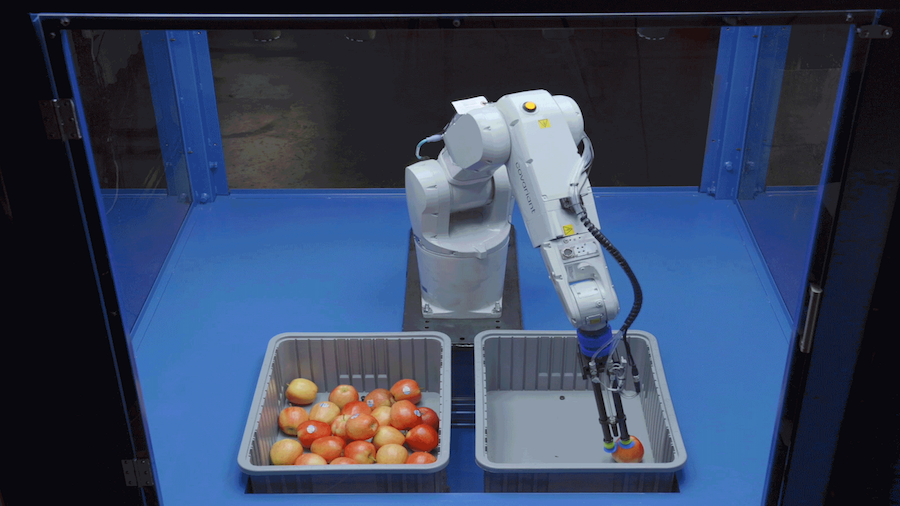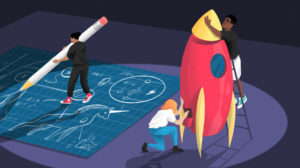Within all industries, companies are under pressure to deliver goods efficiently, fast and reliably, and especially amid the COVID-19 pandemic, in a way that keeps workers safe.
Subscribe to the Crunchbase Daily
Covariant Co-founder and CEO Peter Chen said automation is the key to meeting that challenge. The Berkeley, California-based artificial intelligence robotics company is building universal artificial intelligence that enables robots to see, reason and act autonomously in the real world.
To advance that technology, the company announced that it received $40 million in Series B funding, led by Index Ventures, along with AI-focused Radical Ventures and participation from existing investor Amplify Partners and others.
“We started out in warehouse markets, but there are other places we can expand the technology into,” Chen told Crunchbase News. “We will use the funding on the research and development side to continue to invent breakthroughs, as well as commercialization to scale up the impact.”
This new funding brings Covariant’s total funding to $67 million, according to Crunchbase data. Amplify Partners led the company’s Series A raise of $20 million in January 2019.
As a part of the new investment, Mike Volpi, partner at Index Ventures, will join Covariant’s board.
“We’ve been blown away by Covariant’s team of world-class AI researchers and roboticists and the universal AI they’ve built,” Volpi said in a written statement. “Covariant’s AI, powered by deep learning, will unlock the next wave of robots that learn. We are excited to be a part of Covariant’s journey to become the next great AI company.”
Academic beginnings
The company, founded in 2017, began in an academic research setting by AI researchers at University of California at Berkeley and Open AI. Those researchers include Pieter Abbeel, co-founder, president and chief scientist, Geoffrey Hinton, Jeff Dean, Fei-Fei Li and Daniela Rus, according to the company.
“We started from academic research, looking at universal AI for robotics and how to empower them to do things previously not done because robots can’t perceive the world and how to do things,” Chen said. “We began working on the problem of using AI to make robots more intelligent and, in 2017, we got to the point where we realized there were sufficient ingredients in place to bring this to the real world.”
In January, Covariant came out of stealth mode with a new milestone: Its AI robotics stations were running consistently at customer facilities in North America and Europe, and had achieved autonomy in live production, with a mean unassisted operating time of more than one hour, Chen said.
He explained there is still more AI research to do in the way of advancing the technology, but said Covariant’s perspective is unique in that the only way to advance the science is to have robots in the world and interacting with the most complex situations.
Next steps
In addition to expanding into more industries, Covariant expects to use some of the Series B funding to expand its team, which is currently at 50 employees. Chen said the company had been evaluating new hires due to a strong response from the market, but is going slowly amid the COVID-19 pandemic.
The company is also working on strategic partnerships to accelerate the deployment of robotic stations to customers. One of those came in February, when Covariant announced a partnership with industrial robotics supplier ABB. Then in March, the company joined forces with Knapp, a supplier of intralogistics systems, to work on order-pick automation.
Meanwhile, during COVID, Chen said he is seeing more reliance on robots from customers, including record usage of its offerings during the past couple of months. Although warehousing companies were early adopters of Covariant’s AI technology, he foresees other industries such as parcel mail, manufacturing, agriculture and recycling—where people still use their hands in repetitive motions—where robots could be used.
“People still need items delivered to their homes, but it is hard to get people to work and follow safety rules,” he said. “Instead of relying on manual labor, we see an increased adoption of technology, and that will be continued.”
Photo caption: ABB-Covariant robot picking an apple.
Photo credit: Lindsay Gauthier
Blogroll illustration: Dom Guzman

Stay up to date with recent funding rounds, acquisitions, and more with the Crunchbase Daily.










67.1K Followers